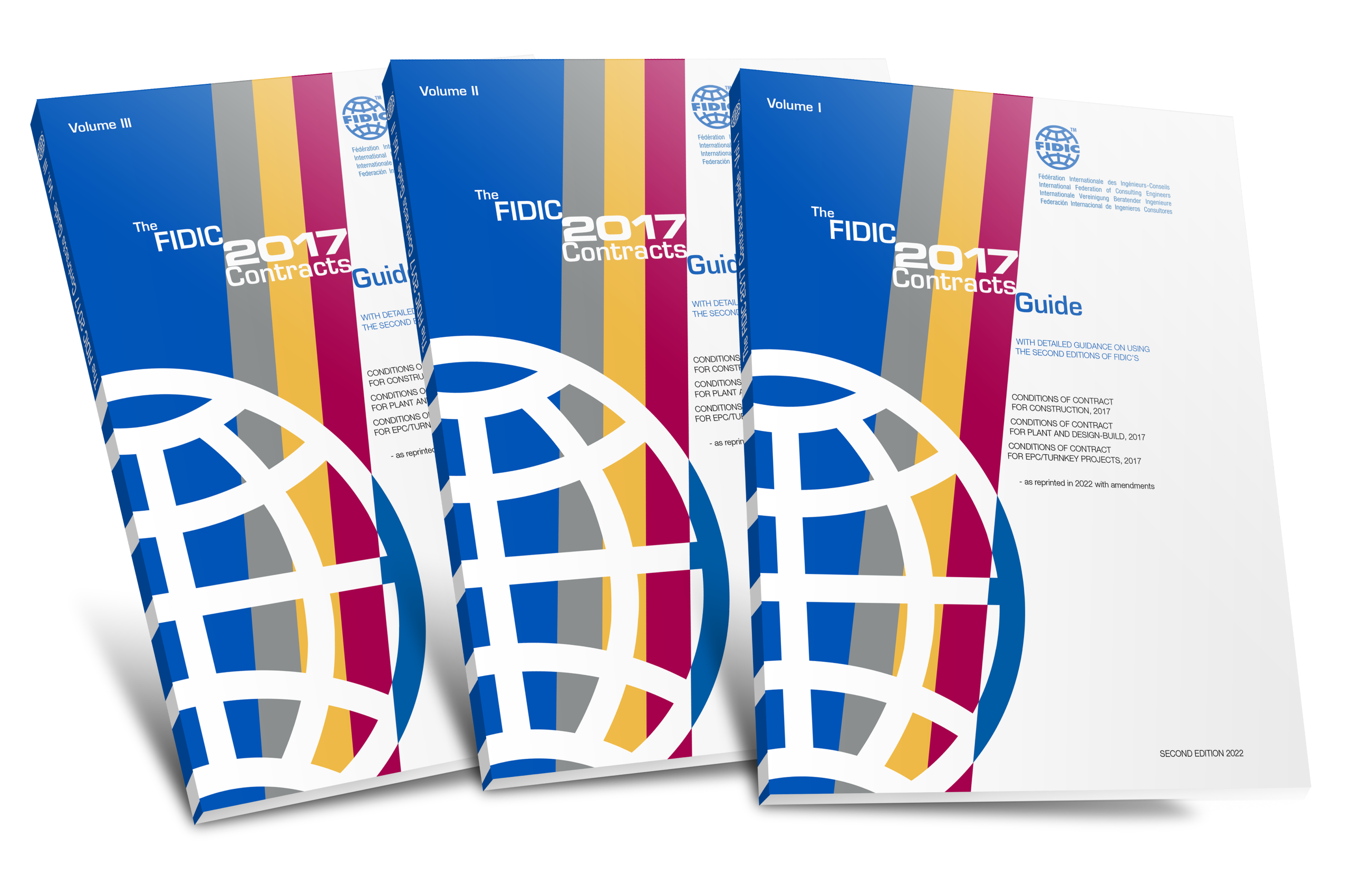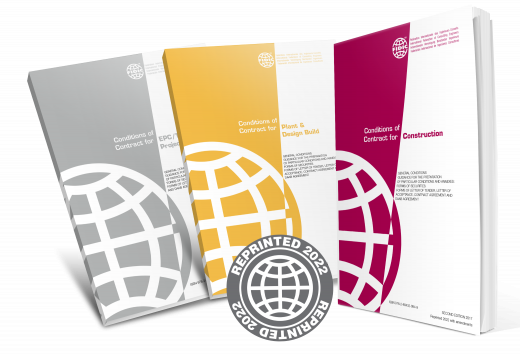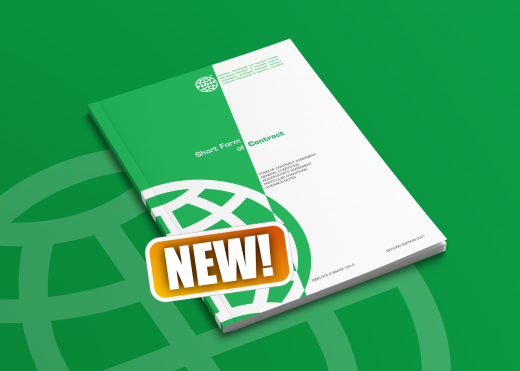The second day of the Official FIDIC Contract Users’ Conference 2023 for Europe, Middle East and Africa (EMEA) region on 11 May 2023 opened with an opportunity to hear from members of the FIDIC Contracts Committee about what is on their current and emerging agenda of work, writes FIDIC communications advisor Andy Walker.
The event, sponsored by leading construction and energy law firm Fenwick Elliott, targeted the contract users’ community in the EMEA region and offered attendees a unique opportunity to share progress on the application and use of FIDIC contracts internationally and across the region.
Main sessions on day two then focused on the practical use of FIDIC contracts, including an update on the 2022 reprints of the FIDIC contracts and the new contracts guide and a discussion on some of the use of 2017 contracts in the region. Another session looked at how the new FIDIC Green Book 2021 is helping to manage project risk with less resources and the final session of the conferenced examined the ever-topical issue of dispute avoidance, offering a regional perspective on the use of dispute boards/DAABs by giving a comparative perspective on their use across the EMEA region.
Introducing the first session with the FIDIC contracts committee, which was chaired by committee chair Vincent Leloup, longstanding special advisor to FIDIC, Nael Bunni of Bunni & Associates, highlighted some of the amendments and changes to recently updated versions of the FIDIC contracts. Chief amongst these changes, said Bunni, were those to the clauses on what constitutes a dispute in the 2017 conditions. Bunni praised FIDIC for its success in having its contracts being widely adopted by leading international funding bodies and other funding organisations, saying that this was a significant achievement and to the benefit of the global industry.
Contracts committee update
FIDIC contracts committee member Kiri Parr then spoke about the work of task group 17, which is looking at the development of a FIDIC collaborative contract. In starting its work, the group paid particular attention to the language being used around the issue of collaboration and market research has been conducted to ensure that the contract meets the needs of potential users. Parr reported that the group was now well into the drafting stage of the document - which as expected on such a contract was a very collaborative process - and she hoped that there would be further progress to report later in the year.
The second contracts committee member to give an update was Adriana Spassova, who spoke about the sub-contract development work being undertaken by FIDIC task group 9. The group has been working for around a year with participation from around the world and was liaising regularly with the contracts committee. Spassova said that all being well she expected that the contract would be published in late 2024, following a review process where the industry would have the opportunity to feedback on the draft document. She also highlighted the work of the task group (TG23) working on net zero clauses for the FIDIC contracts, which again was being worked on by a global grouping of experts.
Mahmoud Abu Hussein then gave an update on the work of the FIDIC task group looking at the area of renewable energy and a contract for offshore wind farms. Hussein said that offshore wind projects was a growing area given the net zero agenda and so it was timely for FIDIC to be developing a contract in this field. He made the point that existing FIDIC forms had been heavily amended for wind farm use and in some cases new forms have been developed by clients that do not follow FIDIC, therefore it was important to develop a more balanced form of FIDIC contract for the offshore wind farm sector. Work was due to start shortly on the contract, following approval by the FIDIC board.
The work of FIDIC task group 20 on the development of a joint venture contract for contractors was then profiled by contracts committee member Jafar Khan. The group was still in its early stages but included membership from around the world to ensure expert legal input. Contracts committee member Husni Madi then gave an update on the work being undertaken by task groups on FIDIC’s Golden Principles, those key aspects of FIDIC contracts that needed to remain intact to ensure the veracity and effectiveness of the contracts.
Contracts committee member Peter Collie then updated on the task group looking at a FIDIC PPP contract. The group was currently reviewing the needs of the PPP sector with a view to ensuring that the model for the contract was correct. Collie said that he hoped that a direction of travel for the contract should be confirmed towards the end of the year following the conclusion of the group’s strategic review of the market’s needs.
Showcasing the 2022 reprints and contracts guide
The second session of day two took a deep dive into the 2022 reprints of the FIDIC contracts and the new contracts guide and a discussion on the use of 2017 contracts in the region. FIDIC general counsel Daduna Kokhreidze introduced the session, which was chaired by contracts committee member Kiri Parr, with a recap of the background to the development of the FIDIC standard forms of contracts since their inception in 1957. She restated the contracts’ fundamental principles which were: - a clear and logical sequence of clauses, the removal of ambiguities, the elimination, so far as possible, of speculative elements and a fair distribution of the risks inherent in works of civil engineering construction.
Engineer and arbitrator and former member of the FIDIC contracts committee Siobhan Fahey then gave a comprehensive and detailed overview of the 2022 reprints, highlighting the key changes and amendments and why these were made. These included matters to be agreed or determined, definition of disputes, errors in items of reference and employer’s requirements, exceptional events, parts, payments, dispute boards and DAABs appointments and in practice and also the conduct of DAABs in an online environment. Fahey concluded by giving an update on the 2022 Contracts Guide, explaining why this was undertaken and how to use the guide in practice.
Chris Seppälä, legal advisor and partner of counsel at White & Case, then talked about the new definitions in the reprints around claims, matters to be determined, disputes and exceptional events, including the rationale behind those redefinitions. There are few people in the world as knowledgeable about FIDIC contracts as Seppälä and attendees were privileged to hear his detailed insights which offered clarity on the new reprints and the reasoning for the changes and amendments made.
Senior prime contracts manager at Bechtel, Waleed El Nemr, then gave an overview of some of the challenges of using the FIDIC 2017 contracts in Egypt and the wider Middle East. These included whether an engineer could really not be acting on behalf of the employer when determining a claim, the role of the engineer more generally under the FIDIC contracts, the use of dispute boards and the take-up of DAABs and the approval of initial project programmes and the review process.
Focus on the new FIDIC Green Book Second Edition
The next session of the conference looked at how the new Second Edition FIDIC Green Book 2021 is helping to manage projects where the perceived level of risk is low and/or where the parties wish to use a simpler form which does not require significant contract administration and management resources.
Mahmoud Abu Hussein, one of the drafters of the new edition, outlined the main drafting objectives for the Second Edition FIDIC Green Book. These were to achieve a balanced risk allocation, simplified contractual machinery, more clarity and certainly and also to update and expand the first edition Green Book’s main features.
Principal drafter for the new Green Book Vincent Leloup then explained more of the thinking behind the changes made to the new edition contract, while Yulia Martyushina, associate director at the European Bank for Reconstruction and Development, offered her perspectives on the how the new Green Book might be used in practice, highlighting and welcoming the key role of the engineer as defined in the contract, which gave some comfort to funding organisations when applied in the right way.
Speaking from a contractor’s perspective, Nabeel Khokhar, expert consultant at Construction Contract Consulting, addressed the neutrality of the engineer under the Green Book, which he said was a positive move, but warned that the choice of engineer should be made wisely to ensure that they were truly impartial and seen to be so. China Irwin, counsel in the international arbitration practice group at LALIVE, also welcomed the defined role of the engineer, but made the point that the usefulness of the engineer would depend on the relationship with the employer and the nature of the project.
The rest of the session took a deeper dive into the new Green Book, the thinking behind the changes from the previous edition and insights and observations on how it can be used on projects. It was clearly of benefit to attendees to hear first-hand from those involved in the drafting of the book and also those who are using it in practice.
Avoiding disputes and resolving them
The final session of the conference, chaired by FIDIC contracts committee member Husni Madi, examined the always-topical issue of dispute avoidance, offering a regional perspective on the use of dispute boards/DAABs by giving a comparative perspective on their use across the EMEA region. The panellists included Fenwick Elliott partner Nicholas Gould, Jason Smit, a partner at Pinsent Mason, Dean Ryburn, partner and Middle East co-head for construction and dispute resolution at Dentons & Co and Yasemin Cetinel, founding partner at Cetinel Law Firm.
Fenwick Elliott’s Nicholas Gould said that there were many dispute boards being used in Europe and Africa, particularly in South Africa, though their use was less prevalent in the Middle East. He highlighted some of his experiences of dispute boards in action and also stressed the dispute avoidance function of dispute boards, saying that they were extremely useful to those willing to engage in the process.
Yasemin Cetinel from Cetinel Law Firm in Istanbul said that it was important to have a focus on dispute avoidance and the wide range of skills of the panelists underlines the correctness of this approach. Jason Smit from Pinsent Mason in South Africa highlighted some of the concerns raised about adjudication - often around cost - and the reluctance of some parties to accept decisions in favour, instead, of taking their chances in court. Dean Ryburn from Dentons & Co made the point that it was vital to address issues as early as possible and once employers and contractors had tried the DAB process then they were more amenable to using them in future.
Session chair Husni Madi piloted a fascinating discussion on the important role that dispute boards play in avoiding project disputes and also the strengthened role they have in the 2017 FIDIC contracts where standing Dispute Avoidance/Adjudication Boards (DAABs) were introduced in all three contracts. Panellists offered their insights and experiences of the use of dispute boards across the EMEA region, including where they are used successfully and also where parties have removed the DAAB as part of their contract requirement.
Summing up the conference, FIDIC CEO Dr Nelson Ogunshakin thanked all the panelists and session chairs for giving up their time to participate. He also singled out sponsors Fenwick Elliott for their support for the event and for their work in the legal and contractual arena supporting the industry. Addressing delegates directly, he said: “It has been an excellent event over the past two days and I hope that you have enjoyed your time with us and will go away better informed about FIDIC contracts and their use across the EMEA region.”
The next FIDIC contract-related event is the Official FIDIC International Contract Users’ Conference and Awards which takes place on 28-29 November 2023 at the Tower Hotel in London. Following the success of last year’s event, it promises to be a must-attend conference for the FIDIC contracts community.










